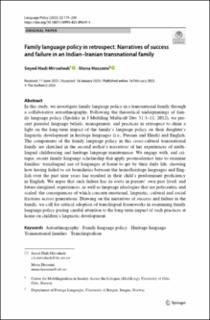Family language policy in retrospect: Narratives of success and failure in an Indian–Iranian transnational family
Journal article, Peer reviewed
Published version

Åpne
Permanent lenke
https://hdl.handle.net/11250/3076495Utgivelsesdato
2023Metadata
Vis full innførselSamlinger
Sammendrag
In this study, we investigate family language policy in a transnational family through a collaborative autoethnography. Following the theoretical underpinnings of family language policy (Spolsky in J Multiling Multicult Dev 31:3–11, 2012), we present parental language beliefs, management, and practices in retrospect to shine a light on the long-term impact of the family’s language policy on their daughter’s linguistic development in heritage languages (i.e., Persian and Hindi) and English. The components of the family language policy in this cross-cultural transnational family are sketched in the second author’s narratives of her experiences of multilingual childrearing and heritage language maintenance. We engage with, and critique, recent family language scholarship that apply postmodernist lens to examine families’ translingual use of languages at home to get by their daily life, showing how having failed to set boundaries between the home/heritage languages and English over the past nine years has resulted in their child’s predominant proficiency in English. We argue that such failure has its roots in parents’ own past lived, and future imagined, experiences, as well as language ideologies that are polycentric and scaled, the consequences of which concern emotional, linguistic, cultural and social frictions across generations. Drawing on the narratives of success and failure in the family, we call for critical adoption of translingual frameworks in examining family language policy paying careful attention to the long-term impact of such practices at home on children’s linguistic development.
